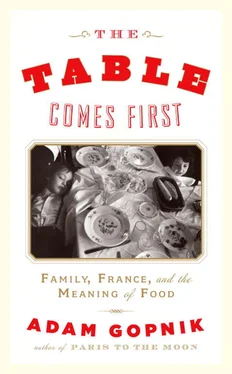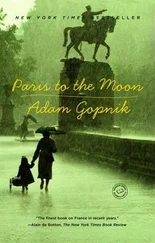And yet something, at least, came out of the quest. I invited Bill Yosses, the White House chef, over for dinner, and laid a small trap for him: I was going to make my mother’s apricot soufflé, and see if I could achieve the zone. Over dinner, we talked desserts some more: the mysteries of plating, the needs of family life.
Then I led him into the kitchen, showed him the apricot-purée base, the transparent egg whites in the unlined copper bowl, the five soufflé dishes waiting to be buttered. He murmured instruction. “Butter around the outer edge, too,” he urged. “All the way around the outer rim like this. Make a small space—climb up to grow up. And then put the dishes in water: not a bain-marie or anything deep, just a shallow tray of water. You don’t want to lower the temperature too much.”
He watched as I beat the egg whites and they thickened and turned opaque. “Do you know why you use unlined copper?” he asked. “It’s for the static electricity. A small electrical storm going off in the bowl.” An act of God, making clouds of white.
We approached the zone, the perfect moment of stiff-but-not-too-stiff peaks. (“DO NOT UNDERBEAT / DO NOT OVERBEAT!”) I beat. He waited. I beat some more. He nodded—go on. I went on, far longer than I usually would, and then he tapped my shoulder. There! That was it. The zone was there: not the gauzy, moist shiny area where I used to stop but a step above.
“I remember how there was one kid at Le Cirque back when who just did this,” Yosses said. “Starting around five-thirty, he had the bouilli or the soufflé base, and he beat egg whites all night.”
As we put the soufflés in the oven, he said, “Fifteen minutes,” and when fifteen minutes had passed he held his hand above them, to measure the heat rising, as much as the texture firming, and nodded one last time.
They were perfect. The apricot intensity shone; the egg whites’ neutrality and airiness softened and lifted it; the hotness gave an edge of taste delight that is always allied to danger, even tiny danger. A thousand small adjustments turn rules into skills, and then three smaller ones turn real skills into art. With Yosses’s help, I had taken something elaborate and made it something that seemed elemental. The primate instinct—get sweets at any price—had been turned into this polished performance. The virginal egg whites, the electric storm that whitened them and made them stiff: the perfect zone was drier and older than I had imagined. You could beat them more and they would be better.
The quest I had undertaken showed, at least, that whatever makes us age, it is not the sugar that we eat. It is the years that are passing. The older we get, the harder we work at everything, even our pleasures. We have to follow the recipes more precisely, put in a sixteenth of an inch of water, if only because we notice our failures more. And yet in return we can sense at last what the pleasures truly are, and where they come from. The fictions that force the feelings become ever dearer to our lives the more fictional we know them to be. Dessert is completely inessential to life; we can do without it; sugar blew in on a bad wind from the Caribbean not so long ago, and we can do without it . And yet it is completely at the center of life, complex and rich enough to make something that touches the edge of art, or at least of stage magic. You never need to eat it; you never miss a chance. It sits as a joke on a primate trait—the chimps that kept after sweetness all the time, like the ones that hungered for sex all the time, ended up making more of themselves than the next bunch of apes—and yet it makes this apricot soufflé, smelling like the kitchen you grew up in. It is the most particular thing; it is the most abstract and conceptual thing. A line of verse enters your head: “Though life is fading / love resists / though sweets are ending / sweet persists.” Sweetness exists outside its objects, as Shakespeare’s favorite adjective, as an idea of the best thing on the table, which, to fully get, we have first to give up.
Ferran’s question is still the one that counts: how do we finish the meal? But then, how do we finish anything? At least I know now that if we beat hard enough, and long enough, and do both more than we ever thought we would have to, we might yet arrive at a lighter end.
18. LAST E-MAIL TO ELIZABETH PENNELL
Dear E.P.:
I want to tell you, finally, about something that happened last summer. Yes, I have gone back to writing to you, my imaginary confidante, whatever you may have thought of Russian Jews on Locust Street in Philadelphia. You were wrong about them, but you were right to be a feminist food critic at a time when no other existed, and to demand that our ancestors be right about everything in advance is as mad as hoping that our descendants will think us right about everything in retrospect. Life is too short, and the room too empty, if we fail to forgive our predecessors everything short of the unforgivable. (What is unforgivable? Ah! That I shall save for another book.) There’s no winning. But there is trying.
And there is dining. I had been haunted enough by Jacques Decour and his last letter, that the obvious thought occurred even to me. We were going back to Paris for a July visit, and I wondered if perhaps the auberge that he mentioned—the Auberge des IV Pavés du Roy, whose menu he wanted to leave for his girlfriend—might have left a trace, however remote, on the world’s store of information. There must be somewhere in some obscure corner of the scholarly Web a reference to the auberge, I thought. After all, I had found traces of the Omelet King—even the Omelet King’s royal omelet pan!
Well, the Auberge des IV Pavés du Roy turns out to have a whole Web page, a menu, a brief history—the works. You can read the menu, the dishes, and see pictures of the place! It turned out to still exist at 55 Avenue du Manet, in Montigny-le-Bretonneux, a small town about an hour outside Paris, not too far from Versailles. Not a well-known small town, or a picturesque one, just a small suburban town. It must be the place—how many Auberges des IV Pavés du Roy could there be? So we made a date to go out on a beautiful July Thursday; I discouraged the kids, but they wanted to get out of Paris and the heat, or wanted to be near us, or maybe they were actually interested.
It was a nice place, a very nice place, in that half-in-the-country, half-not-in-the-country way of French inns. It was an old-fashioned stuccoed auberge, with a cast-iron sign hanging out front and a pretty garden in the back, and a children’s play set near the garden. The cook was the husband, and the very harried but trying-hard hostess was his wife. There was some kind of local event going on when we arrived, and, puzzled to have taken a reservation all the way from Paris—we had called the day before to confirm and ask the way—Madame had a table for us in the garden. We sat and waited, at first a bit awkwardly—what were we doing here, after all?—and then comfortably, as the commis , right out of Marcel Pagnol, brought us bread, which reassured the children, and then Sancerre rouge, nicely cold, which reassured the parents. Then the menus came, and you know how it is when menus come, Elizabeth, it is hard to stay awkward—the act of ordering, choosing, is itself so touched by hope. I doubt that anyone can completely despair when menus appear. (In movies and television shows, when they want to create a mood of absolute alienation they always set the thing in a cafeteria.)
So we ordered and then we talked, naturally enough, about the Resistance. Luke, now sixteen, asked me if “in the big picture” the Resistance had made any difference. I tried to explain that it all depends what you mean by difference. No, they hadn’t really done much, spending a lot of time on guard against one another’s betrayals and fighting among themselves, socialists against Christian Gaullists and communists, who were courageous but committed to Stalin, against everyone else. And they were the victims of horrible retaliation by the Germans, satanic cruelty even in a relatively placid occupation zone like France. So, no, they hadn’t really made much of a difference to the outcome of the war.
Читать дальше












